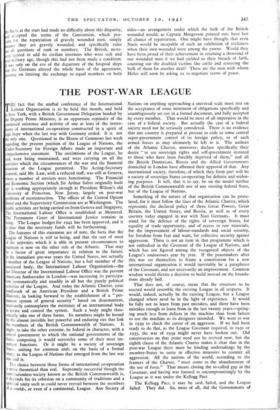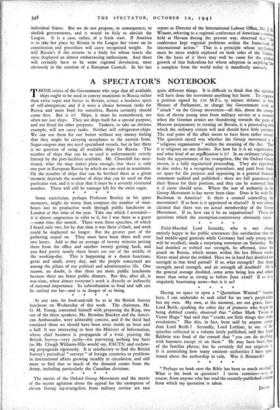THE POST-WAR LEAGUE
HE fact that the anntial conference of the International Labour Organisation is to be held this month, and held New York, with a British Government Delegation headed by the Deputy Prime Minister, is an opportune reminder of the ontinued existence and activity of one at least of the instru- ents of international co-operation constructed in a spirit of gh hope when the last war with Germany ended. It is not e only one. Questioned in the House of Commons last week egarding the present position of the League of Nations, the Under-Secretary for Foreign Affairs made an important and omprehensive statement. The instirntions of the League, he aid, were being maintained, and were carrying on all the ctivities which the circumstances of the war and the financial nuation of the League permitted. The Acting-Secretary eneral, said Mr. Law, with a reduced staff, was still at Geneva, 'here a number of services were functioning. The Financial d Economic Section (which Sir Arthur Salter originally built up) is working appropriately enough at President Wilson's old University of Princeton, New Jersey, largely on post-war problems of reconstruction. The offices of the Central Opium Board and the Supervisory Commission are at Washington. The ealth activities are being carried on from Geneva and Singapore. The International Labour Office is established at Montreal. The Permanent Court of International Justice remains in being. The League budget for 1942 has been approved, and it is clear that the necessary funds will be forthcoming.
The features of this statement are of note, the facts that the League of Nations is still in being, and that the seat of most of the activities which it is able in present circumstances to maintain is now on the other side of the Atlantic. That may be a factor of great importance in relation to the future. In the immediate pre-war years the United States, not actually member of the League of Nations, but a full member of the associated body, the International Labour Organisation—the last Director of the International Labour Office was the present American Ambassador in London—was increasing its participa- tion systematically and steadily in all but the purely political activities of the League. And today the Atlantic Charter, joint handiwork of an American President and a British Prime Minister, in looking forward to the establishment of a "per- manent system of general security" based on disarmament, necessarily contemplates the existence of an international body to create and control the system. Such a body might theo- retically take one of three forms. Its members might be bound by the almost invisible but powerful and enduring ties that link the members of the British Commonwealth of Nations. It might, to take the other extreme, be federal in character, with a central government to which the national governments of the States composing it would surrender some of their most im- portant functions. Or it might be a society of sovereign States, uniting for common ends on the basis of a formal treaty, as the League of Nations that emerged from the last war was and is.
The choice between those forms of international co-operation is mere theoretical than real. Supremely successful though the oust! tutionless-society known as the British Commonwealth is, t depends for its cohesion on a community of traditions and a Spiritual unity such as could never prevail between the members of a world-, or even of a continental, League. Any Society of Nations on anything approaching a universal scale must rest on the acceptance of some minimum of obligations specifically and unambiguously set out in a formal document, and fully accepted by every member. That would be most of all imperative in the case of a federal society. But actually the case of a federal society need not be seriously considered. There is no evidence that any country is prepared at present to cede to some central super-government control of its foreign policy, or of such armed forces as may ultimately be left to it. The authors of the Atlantic Charter, moreover, declare specifically their desire "to see sovereign rights and self-government restored to those who have been forcibly deprived of them," and all the British Dominions, Russia and the Allied Governments domiciled in London have affirmed their approval of that. Any international society, therefore, of which they form parr will be a society of sovereign States co-operating for definite and widen- ing purposes. It will, that is to say, be on the model neither of the British Commonwealth nor of any existing federal State, but of the League of Nations.
Something of the nature of that organisation can be postu- lated, for it must follow the lines of the Atlantic Charter, which represents the declared policy of three Great Powers, Great Britain, the United States, and Russia, as well as of every country today engaged in war with Nazi Germany. It must stand for the defence of the rights of sovereign States, for equality of trade opportunity, and of access to raw materials, for the improvement of labour-standards and social security, for freedom from fear and want, for collective security against aggression. There is not an item in that programme which is not embodied in the Covenant of the League of Nations, and which has not figured among the recognised objects of the League's endeavours year by year. If the peacemakers after this war set themselves to frame a constitution for a new international organisation it would inevitably be a paraphrase of the Covenant, and not necessarily an improvement. Common wisdom would dictate a decision to build instead on the founda- tions already laid.
That does not, of course, mean that the structure to be erected would resemble the existing League in all respects. It would, indeed, actually be the existing League, but a League changed where need be in the light of experience. It would be folly not to learn from past mistakes, and there have been mistakes enough to learn from in the last twenty years—spring- ing much less from defects in the machine than from failure to use the machine as its designers intended. We went to war in 1939 to check the career of an aggressor. If we had been ready to do that, as the League Covenant required, in 1931 or 1935, the war of 1939 might never have broken out. Old controversies on that point need not be revived now, but the eighth clause of the Atlantic Charter makes it clear that in the post-war League there must be binding undertakings by the member-States to unite in effective measures to counter all aggression. All the nations of the world, according to the framers of the Charter, "must come to the abandonment of the use of force." That means closing the so-called gap in the Covenant, and having war banned as uncompromisingly by the League as it was under the Kellogg Pact.
The Kellogg Pact, it may be said, failed, and the League failed. They did. So, most of all, did the Governments of individual States. But we do not propose, in consequence, to abolish governments, and it would be folly to abolish the League. It is a case, rather, of a fresh start. If America is to take her place by Britain in the League her views on its constitution and procedure will carry recognised weight. So will Russia's if she returns to a body for whose tenets she once displayed an almost embarrassing enthusiasm. And there will certainly have to be some regional devolution, most obviously in the creation of a European Council. In his last report as Director of the International Labour Office, Mr. J. G. Winant, referring to a regional conference of American countries held at Havana during the present war, observed that " the conference kept regional problems within the framework of international action." That is a principle whose application must be more widely explored on both sides of the Atlantic. On the basis of it there may well be room for the gradual growth of that federalism for whose adoption in anything like a complete form the world today is manifestly unready.



























 Previous page
Previous page